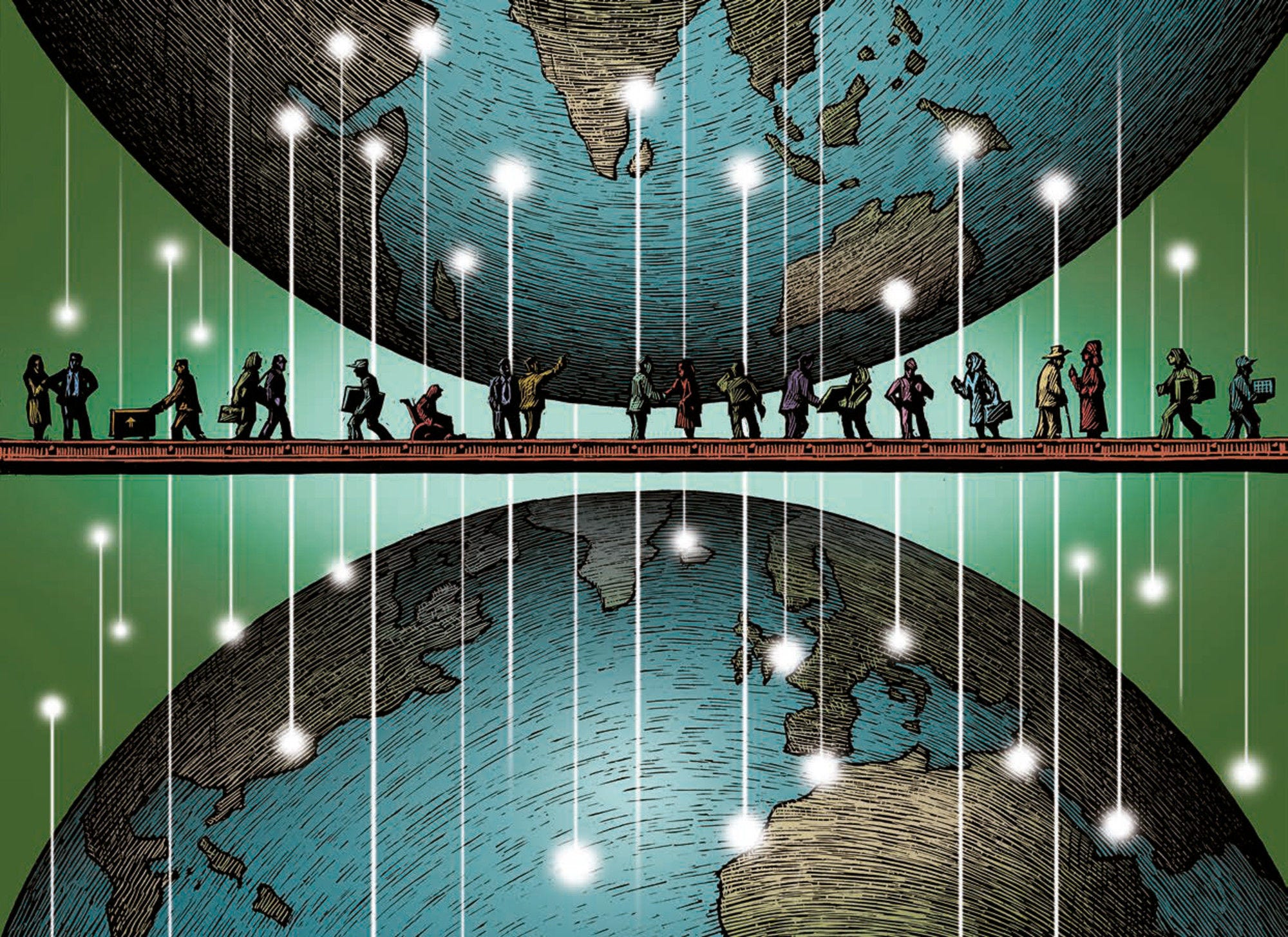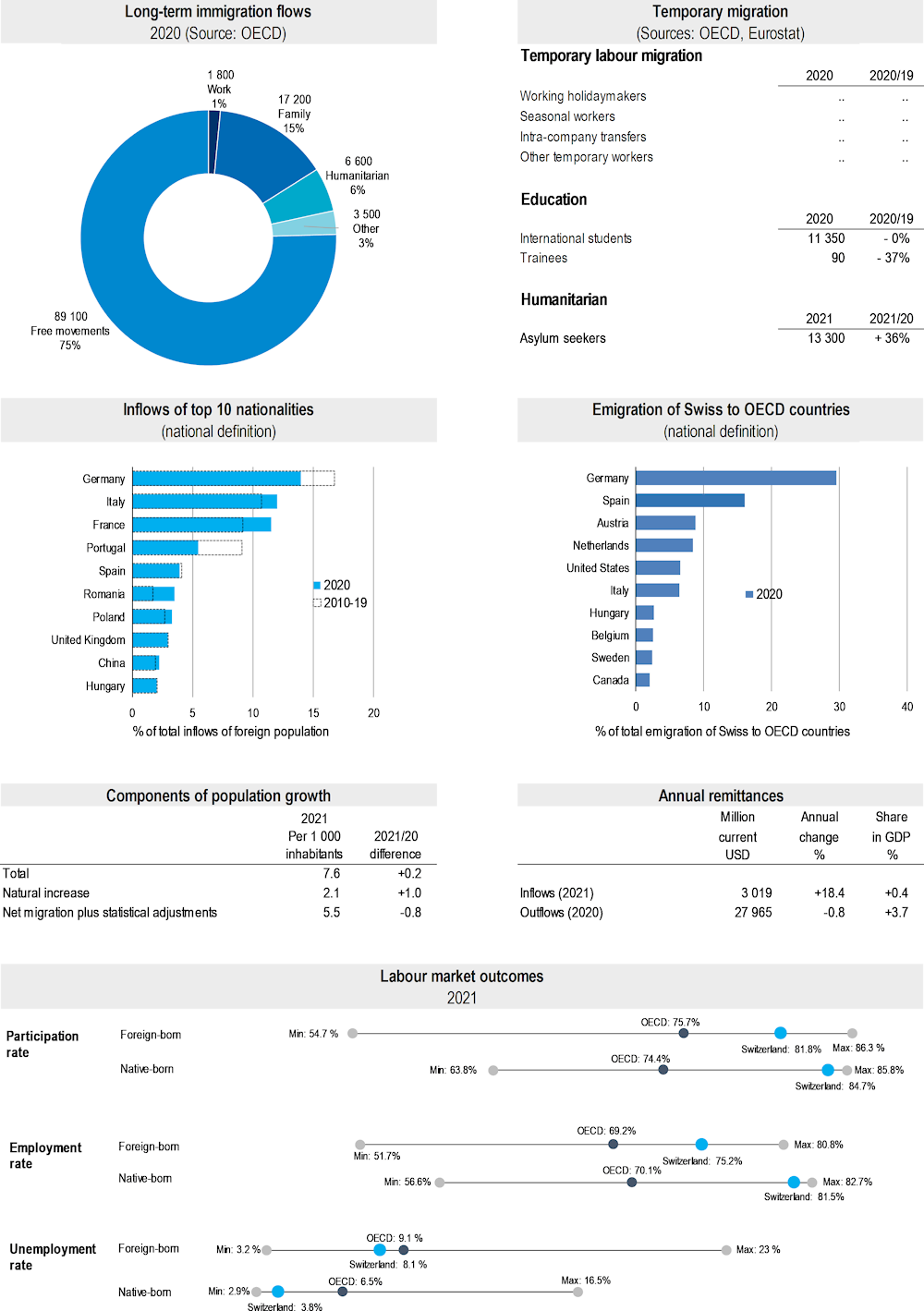In 2020, Switzerland received 118 000 new immigrants on a long-term or permanent basis (including changes of status), ‑3.6% compared to 2019. This figure comprises 75.4% immigrants benefitting from free mobility, 1.5% labour migrants, 14.5% family members (including accompanying family) and 5.6% humanitarian migrants. Around 11 000 permits were issued to tertiary-level international students. In addition, 177 000 intra-EU/EFTA postings were recorded in 2020, a decrease of ‑28% compared to 2019. These posted workers are generally on short-term contracts.
Germany, Italy and France were the top three nationalities of newcomers in 2020. Among the top 15 countries of origin, France registered the strongest increase (1 800) and Portugal the largest decrease (‑800) in flows to Switzerland compared to the previous year.
In 2021, the number of first asylum applicants increased by 36.1% to reach around 13 000. The majority of applicants came from Afghanistan (2 000), Eritrea (1 700) and Algeria (1 000). The largest increase since 2020 concerned nationals of Afghanistan (1 300) and the largest decrease nationals of Sri Lanka (‑70). Of the 9 940 decisions taken in 2021, 91% were positive.
In the context of a complementary mandate of the Swiss Integration Agenda – launched in 2019, the asylum financing system will be reformed in order to harmonise the tasks of the Confederation and the cantons concerning care, social assistance and the promotion of integration, starting 1 January 2023. Specifically, to increase incentives for young individuals to take on vocational training, the Confederation will pay cantons a lump sum for refugees and temporarily admitted persons aged 18 to 25 regardless of their employment or training status. In addition, a “low income” correction factor will be introduced for refugees and temporarily admitted persons aged 25 to 60 to avoid disincentives for vocational training or part-time employment in these age groups. A lump sum will no longer be deducted for persons with an income of CHF 600 or less, thereby reducing the financial burden on the cantons. The current financing system will be maintained for asylum seekers.
Protection against discrimination has been guaranteed by the Federal Act on Foreigners and Integration (LEI) since 2019 and efforts have mainly focused on raising awareness in ordinary structures. From 2022, anti-discrimination efforts will also aim at strengthening the authorities and institutions in a targeted manner, especially regarding discriminations in job searches.
Since 1 January 2022, the government has granted freedom of movement to Croatian citizens, who now follow the same immigration procedure as EU nationals and face fewer requirements to work in Switzerland. However, if it causes serious disturbances to the labour market, the government will be allowed to limit the number of work permits issued to Croatian nationals from 2023 to the end of 2026.
The Federal Council amended the Ordinance on Entry and the Granting of Visas (EGVO) to allow Australian nationals to enter the country without a visa, beginning 1 January 2022, regardless of the purpose and duration of their stay, nonetheless, they have to require a permit if they plan to stay in Switzerland for more than three months or if they intend to work in Switzerland. In addition, Swiss nationals have been granted access to the Australian Work and Holiday Programme.
The quotas on work permits, which increased in 2019 for non-EU/EFTA nationals, have remained unchanged in 2020, 2021 and 2022 for EU/EFTA service providers, non-EU/EFTA and UK nationals.
Regarding COVID‑19‑related measures, Switzerland and the EU have mutually recognised their vaccination certificates to facilitate travel procedures. Since October 2021, submitting a COVID‑19 test has become mandatory for persons who are forced to leave Switzerland to ensure the execution of removal orders. If necessary, tests can also be carried out against their will. This regulation of the LEI is valid until 31 December 2022. As of 17 February 2022, Switzerland has lifted its entry restrictions for all travellers except for those coming from high-risk countries.
For further information: www.sem.admin.ch

